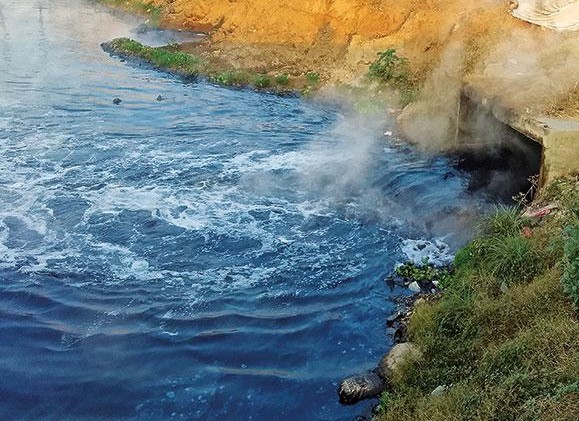 The North American Punjabi Association (NAPA) has issued an urgent call for action regarding the deepening pollution crisis in the Budha Nallah in Ludhiana. NAPA Executive Director S. Satnam Singh Chahal said that once a pure fresh water drain, Budha Nallah has today become a toxic drain that poses a threat to the ecosystem, groundwater, agriculture and public health in the Malwa region of Punjab.
The North American Punjabi Association (NAPA) has issued an urgent call for action regarding the deepening pollution crisis in the Budha Nallah in Ludhiana. NAPA Executive Director S. Satnam Singh Chahal said that once a pure fresh water drain, Budha Nallah has today become a toxic drain that poses a threat to the ecosystem, groundwater, agriculture and public health in the Malwa region of Punjab.
Chahal said that studies conducted by the Punjab Agricultural University have revealed shocking levels of pollution in the drain. Heavy metals like chromium, nickel, arsenic and lead have been found in dangerously high concentrations, along with extremely high levels of chemical and biological oxygen demand (COD and BOD). He said that a report by the Punjab Biotechnology Incubator has revealed that the BOD of Budha Nallah water has reached 154 mg/litre, which is far above the safe limit of -8. The coliform count was recorded at 1.72 crore, while the safe limit for bathing water is only 500. These findings clearly establish the role of unmanaged industrial pollutants, especially from dyeing units, in making the water toxic.
This unchecked pollution has resulted in immense damage to public health. Groundwater, crops and soil in the Malwa region have been infiltrated with toxic metals, organic pollutants and pesticide residues. Epidemiological studies have documented high rates of cancer, especially breast, cervical, gastrointestinal and blood cancers, in communities along the Budha drain. Respiratory diseases, skin diseases, reproductive problems and developmental disorders in children are also alarmingly common. Villages near the drain are now tragically called “cancer homes”.
The problem is not limited to environmental pollution – it is rooted in governance failures. A recent government survey revealed that 156 outlets are still discharging untreated sewage and industrial waste into the drain. Inspections by the Central Pollution Control Board have also confirmed that none of Ludhiana’s sewage or general wastewater treatment plants fully comply with the prescribed discharge norms. Instead of tightening the norms, the Punjab government has amended the pollution control laws to remove criminal liability for polluters. Factory owners now face only financial penalties, which they readily accept as a cost of doing business. This weakens the accountability framework and encourages industries to continue polluting without fear of severe punishment.
NAPA strongly condemns this policy change and calls for immediate corrective measures. There is an urgent need for stricter enforcement of environmental regulations, restoration of criminal penalties, and mandatory installation of treatment plants. The government should expand health care facilities by setting up cancer-screening centers, mobile clinics, and disease surveillance units in affected areas. Groundwater and soil treatment should be prioritized to prevent further spread of toxins into the food chain.
“Fine alone will not clean our waters or heal our people. We demand justice, not laziness,” said N Chahal, adding that “before the ‘cancer belt’ of Malwa becomes a full-blown humanitarian disaster, the Punjab administration should act on science rather than politics.”